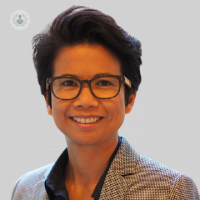One-stop breast clinic: Everything you need to know
Escrito por:If you notice some changes in your breast, it is completely normal to be apprehensive or nervous to get it checked out. You may be scared about what to expect, about not knowing what scans you may need, and perhaps also about what may be found. The truth is, the majority of breast concerns turn out to be nothing worrying at all, but you won't know unless you get them checked.
In her latest online article, renowned consultant oncoplastic breast surgeon Ms Tasha Gandamihardja helps put your mind at ease by explaining exactly what happens when you go to get your breasts checked out at a one stop breast clinic.

What type of clinic are breast examinations done in?
In the UK, you will likely attend a one stop breast clinic. This essentially means that everything is done during one visit. These kinds of clinics are also known as rapid diagnostic clinics or same-day clinics.
I would suggest setting aside about an hour and a half to two hours for your appointment. Sometimes clinics can be delayed, so I would suggest giving yourself enough time for this. Bring something along to read, or maybe something to listen to, and even somebody for company.
Here, you will get what is called a triple assessment, and this includes a physical examination, scans if necessary, and biopsies if necessary. So, all is done during one clinic visit, which of course saves time, but it also reduces the anxiety of having to return for multiple visits. That means at the end of the day, you will leave with a diagnosis and an explanation of the cause of your symptoms. If all is well, then you'll be discharged back to your referring doctor or your GP or family physician.
However, if you did have a biopsy, then you'll be asked to return usually within a week or 10 days for the results.
What happens when I see the doctor?
Firstly, the doctor will ask about your symptoms, for example:
- how long you've had your lump
- whether it's changed at all recently
- how long you've had your breast pain or the changes in your breast shape or skin
Whatever your symptoms are, the doctor will want to know about it in more detail. They will also ask about your medical history as well as your family history of breast cancer. Once the doctor has all that information, the next step will be the physical examination. And for this, you'll be asked to get undressed from the top half. There should be a chaperone present and you could always request a chaperone during your examination if there isn't one there already.
If the doctor feels you must have scans, then you will either have an ultrasound or a mammogram, or both. In the UK, mammograms are only done if you are over the age of 40. This is because young people's breasts are quite dense and it has been found that mammograms aren't particularly helpful in detecting lesions in the absence of any clinical or ultrasound-detected lesions.
If you are under 40 and we find something suspicious, either clinically or on the ultrasound, you will get a mammogram.
What if there is something abnormal?
If this is the case, a biopsy will be performed, usually there and then. It is done under local anaesthetic, which is injected to numb the area. Once this is done, a sample of the lump or the area of concern is taken with a biopsy needle. Sometimes, three or four samples are taken. This is done to ensure we get a good representative tissue sample.
The procedure doesn’t take very long, and it shouldn’t be painful. The worst part of the procedure is actually the local anaesthetic injection. Once the specimens are taken, they will be sent to the lab for analysis. After the scans have been taken, you usually go back to see the doctor to discuss the results. If all is fine, you can leave the clinic knowing your symptoms have been thoroughly investigated. You will be given appropriate advice and some written information to take home with you.
If you had a biopsy and it turned out to be cancer, a variety of different treatment options are available.
If you would like to book a consultation with Dr Tasha Gandamihardja, you can do so today via her Top Doctors profile.


